Some of today’s biggest film directors started out as actors—Mel Gibson, Ron Howard, Clint Eastwood, and Woody Allen, for example—and in 2007 that trend only seems to have gotten bigger, with movies out by Robert Redford (“Lions for Lambs”), Sean Penn (“Into the Wild”), Sarah Polley (“Away From Her”), Julie Delpy (“2 Days in Paris”), Ben Affleck (“Gone Baby Gone”), Anthony Hopkins (“Slipstream”), and Ethan Hawke (“The Hottest State”). 2008 is shaping up to be no different with movies directed by Helen Hunt (Then She Found Her”), Gael Garcia Bernal (“Deficit”), Denzel Washington (“The Great Debaters”), George Clooney (“Leatherheads”), David Schwimmer (“Run, Fat Boy Run”), Stuart Townsend (“Battle in Seattle”), and Frank Whaley (“New York City Serenade”) all slated for release.
Hell, it happens so much these days that The Onion has their own story concerning even the smallest actors in Hollywood’s pecking order. Not including actors who are mainly known as directors like Eastwood, Howard, Allen, Orson Welles, Charlie Chaplin, and Buster Keaton, I’ve compiled ten movies I think you’ll find interesting.
My list of the Top 10 Movies Directed by Actors follows J.D.’s from last week, so I’ve left off Tom Hanks’ splendid “That Thing You Do!” and Gary Sinise’s “Of Mice and Men” just for variety’s sake. For that same reason, I’ve also left off “Frailty,” directed by Bill Paxton, (which appeared on my Overlooked Horror Movies list), and the transcendent “The Night of the Hunter,” directed by Charles Laughton (which was on my Villains and Directorial Debuts lists and most surely would have been my number one). That said, enjoy! J.D.’s list from last week is here.
Also, check out the embedded links; some of them go to actual scenes from the films themselves!
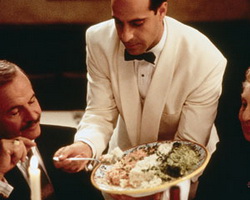 10. Big Night (1996) / Campbell Scott, Stanley Tucci
10. Big Night (1996) / Campbell Scott, Stanley Tucci
I’m getting hungry just thinking about this movie. Modern filmmakers sometimes lack the patience of older films. I love any movie that is not afraid to show a process, and by letting us watch the delicious-looking Italian food being prepared in this film, co-directors Scott and Tucci make the dishes come alive. You can practically smell the mouth-watering aromas right through the screen. Two Italian immigrant brothers (played by Tony Shalhoub and Tucci, who also co-wrote the movie as well) with a failing restaurant get an unlikely opportunity when their competitor (Ian Holm, whose food is just bland and inoffensive enough to be popular) offers to invite famous bandleader Louis Prima eat there for one big night. It is a subtle movie about family and trust, and a sad reminder that the ones who are usually really good at something will toil in obscurity while the best-marketed ones will flourish. It is also a tribute to the healing power of passionately-prepared food.
Primo: People should come just for the food.
Secondo: I know. Primo, I need your help here, okay? Louis Prima is coming! He’s not just some guy, he’s famous!
Primo: Famous? Is he good?
Secondo: He’s great.
Primo: People should come just for the food.
Secondo: I know that.
Primo: People should come just for the food!
Secondo: I know that, I know. But they don’t.
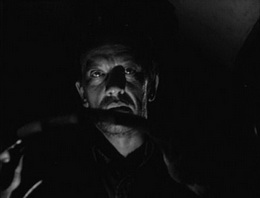 9. The Hitch-Hiker (1953) / Ida Lupino
9. The Hitch-Hiker (1953) / Ida Lupino
William Talman plays a psychopathic killer on the run in this taut B-movie film noir from Ida Lupino, best known for playing opposite Humphrey Bogart in “High Sierra.” Not only is it the first noir directed by a woman, but its one of only five movies the actress ever directed. Lupino came from a respected family involved in the British theater, so how she came to co-write and direct this sick psychological game of cat-and-mouse is beyond me. Talman is the title character, and gets picked up in the desert by two unsuspecting fishing buddies after a major killing spree. A man who literally sleeps with one eye open (an affliction); he takes them hostage at gunpoint. Unlike most noirs, it was shot almost entirely on location, but the patterns of shadows and light definitely subscribe to the noir ethos—Talman’s face isn’t even shown during the murderous opening montage.
Emmett Myers: You guys are soft. You know what makes you that way? You’re up to your neck in IOU’s. You’re suckers! You’re scared to get out on your own. You’ve always had it good, so you’re soft. Well, not me! Nobody ever gave me anything, so I don’t owe nobody!
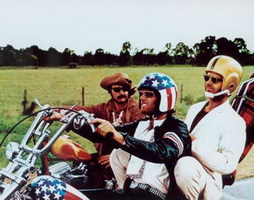 8. Easy Rider (1969) / Dennis Hopper
8. Easy Rider (1969) / Dennis Hopper
It hasn’t aged particularly well, but Hopper’s hippie road picture was a cultural turning point and still has power as a snapshot in time. Besides proving that there was a mass audience for this kind of film, it signaled the end of the peace and love era with a couple shocking blasts of a shotgun. It’s a wonder that the movie ever came together in one cohesive piece, from the reports of the director’s on-set behavior and severe paranoia. The hallucinatory trip in New Orleans during Mardi Gras was a last-minute thrown-together mess that must have benefited from its chaos-filled shoot. Peter Fonda’s ironic “Captain America” biker look even became trendy. It remains an accurate portrayal of the attitudes of the time, and is also notable for introducing Jack Nicholson to mainstream audiences. He was nominated for Best Supporting Actor for his scene-stealing turn as a law-breaking, alcoholic ACLU lawyer.
Billy: Hey, man. All we represent to them, man, is somebody who needs a haircut.
George Hanson: Oh, no. What you represent to them is freedom.
Billy: What the hell is wrong with freedom? That’s what it’s all about.
George Hanson: Oh, yeah, that’s right. That’s what’s it’s all about, all right. But talkin’ about it and bein’ it, that’s two different things. I mean, it’s real hard to be free when you are bought and sold in the marketplace. Of course, don’t ever tell anybody that they’re not free, ’cause then they’re gonna get real busy killin’ and maimin’ to prove to you that they are. Oh, yeah, they’re gonna talk to you, and talk to you, and talk to you about individual freedom. But they see a free individual, it’s gonna scare ’em.
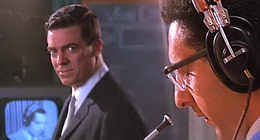 7. Quiz Show (1994) / Robert Redford
7. Quiz Show (1994) / Robert Redford
This movie is light years away from the transparent nature of Redford’s newest misfire, “Lions for Lambs.” It seems so naïve now, but in 1958, the producers of popular game show 21 asked grating champion Herb Stempel (magnificently played by John Turturro) to throw a question so that handsome professor Charles Van Doren (Ralph Fiennes) could win. The TV show stands for everything about this exploitative turning point in American culture—a time when advertising gained the upper hand, dishonesty only mattered if you didn’t get caught, and outward appearances were everything. Beyond that, it works amazingly well as a complicated character drama. When the scandal breaks out, the movie focuses on the toll paid by the contestants, while the architects of the whole scam—the producers—get off a lot easier. All this is carried out with an understatement that is missing in Redford’s newest work.
Dick Goodwin: I thought we were gonna get television. The truth is… television is gonna get us.
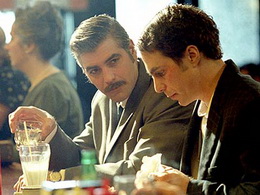 6. Confessions of a Dangerous Mind (2002) / George Clooney
6. Confessions of a Dangerous Mind (2002) / George Clooney
Sure, Clooney got a Best Director nomination for “Good Night, and Good Luck,” but that was like a chamber piece compared to his manic debut. Working from a script by absurdist scribe Charlie Kaufman that itself adapted the strange autobiography of “The Gong Show” host Chuck Barris, Clooney skillfully blended wildly divergent tones together to create a surprisingly tragic and high-energy film. Using the much-contested premise touted in his book, that Barris (Sam Rockwell) was a hitman for the CIA during his reign as producer of top-rated, lowbrow TV in the 1970s, Clooney forges ahead to tell the story of a man who lost his soul. There’s plenty of room for deadpan comedy, and Clooney in gets in on some of the action as Barris’ CIA boss Jim Byrd, but what’s surprising about “Confessions” is how effortlessly Clooney portrays his character’s swing into depression without missing a beat. In a story that is just too wild to be true, Clooney makes us believe not only that it could have happened, but that secretly killing overseas agents for the U.S. government was just one part of the complicated pie chart that led to Barris’ downfall. Filming Barris himself before the camera was a bold move that may seem weird on paper, but works beautifully in the context of the movie. Did I mention that Julia Roberts has one of her greatest roles ever in this movie and she isn’t even mentioned on the DVD box?
Jim Byrd: Think of it as a hobby. Something you do to relax. You’re an “assassination enthusiast.”
 5. Trees Lounge (1996) / Steve Buscemi
5. Trees Lounge (1996) / Steve Buscemi
It may not have been written by the poet laureate of alcoholics, Charles Bukowski (like 1987’s “Barfly” and 2005’s “Factotum” were), but this small indie release from writer/director/actor Steve Buscemi has just the right air of authenticity anyway. In fact, it’s a better film than both of those adaptations because it feels more personal. Buscemi plays Tommy, a thirty year-old townie that drives an ice cream truck by day (just like Buscemi did at one point) and drinks a lot in a local bar by night. The regulars at the Trees Lounge have the same beaten-down aimless quality that Tommy has, but Buscemi manages to come across as more of a decent guy. This is despite the fact that Tommy does some really selfish things that hurt a lot of people. The movie is has a real lived-in feel that permeates every scene, and Tommy’s interactions with others, including a young Chloe Sevingy, always seem to turn out bad. He feels trapped in his situation and is regretful about his past, but too scared to do anything about it. There is no preachiness and no big message, just flawed characters going through their daily routine.
Vic: [about having another glass of whiskey] You’re a weak man.
Tommy: Yeah, I know. That’s why I drink it straight. The ice cubes are too heavy.
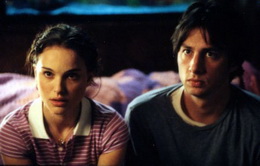 4. Garden State (2004) / Zach Braff
4. Garden State (2004) / Zach Braff
Zach Braff’s tale about a psychologically-stunted young man (Braff) who is helped out of his funk by an effervescent girl (Natalie Portman) was a huge hit that came straight out of left field. This quietly powerful and funny movie did more than cement him as the architect of the ultimate hip soundtrack (a title he temporarily swiped from Quentin Tarantino), at least for a little while. It made him the unofficial spokesman for a generation. In the film, his character eases out of his depression by getting over a family tragedy and ending years of self-medication. It is symbolic of young people today who are apathetic and feel inured by everything and attracted to nothing. Comparisons to the similarly generation-defining “The Graduate” may come partly from Braff’s liberal use of pop music on the soundtrack (including a Simon & Garfunkel song), but “Garden State” deserves that comparison for so many more reasons. It’s a tragic, funny, compelling tribute to what makes different people different, and it even manages to have a more hopeful ending.
Sam: If you can’t laugh at yourself, life’s gonna seem a whole lot longer than you like.
Andrew Largeman: All right, so what are we laughing at you about?
Sam: I lied again… I have epilepsy.
Andrew Largeman: Which part are we laughing about?
Sam: had a seizure at the law office where I work, and they told me their insurance wouldn’t cover me unless I wore preventative covering.
Andrew Largeman: What’s preventative covering?
Sam: The helmet I was wearing… Oh come on, that’s funny. That’s really funny, I mean I’m the only person who wears a helmet to work who isn’t putting out fires or racing for NASCAR. But what do you do, I can’t quit… their insurance is amazing, what do you do? You laugh. I’m not saying I don’t cry but in between I laugh and I realize how silly it is to take anything too seriously. Plus, I look forward to a good cry. It feels pretty good.
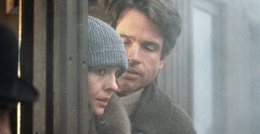 3. Reds (1981) / Warren Beatty
3. Reds (1981) / Warren Beatty
In the interest of not repeating myself too many times, I’ve chosen to go with Beatty’s sweeping historical epic of the communist movement in the early 20th Century instead of his hilariously scathing indictment of politics-as-usual in “Bulworth.” (Check out my Overlooked Films Top 10 for that entry.) Often this movie is portrayed as a romantic film, but there isn’t a lot of romance here. In fact, it would be more accurate to use it as a measuring stick to judge your commitment to something you believe in. American journalist John Reed (Beatty) had a long relationship with Louise Bryant (Diane Keaton), but it was constantly overshadowed by his obsession with the exciting momentum of the Soviet communist party in the U.S. and Russia. He also peppers the story with real-life accounts from “witnesses” who were there during the Revolution, such as Henry Miller and ACLU founder Roger Nash Baldwin. Making a three-hour celebration of communistic idealism at the height of a renewed cold war was not a very marketable idea, but the movie was a success anyway, becoming the last film to receive nominations in all four acting categories. Beatty won the Best Director Oscar for “Reds,” but lost Best Picture, in a surprise upset, to the inspirational religious sports fable “Chariots of Fire.”
John Reed: Louise, I love you.
Louise Bryant: No, you love yourself! Me, you f**k!
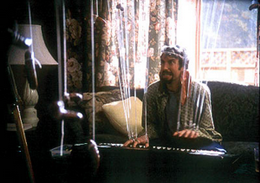 2. Freddy Got Fingered (2001) / Tom Green
2. Freddy Got Fingered (2001) / Tom Green
It may be universally hated and the recipient of five Golden Raspberry Awards, but nothing can dim my unadulterated love and respect for this wonderful piece of absurdist cinema. In a perfect world, Tom Green’s “Freddy Got Fingered” would be in a museum next to Rene Clair’s “Entr’acte,” a short film that is in exactly the same spirit, but is renowned for being one of the first Dadaist masterworks. Just look at the set pieces in “Freddy”: the backwards man, the cheese sandwich shop, sausages tied to pulleys through the ceiling and Green’s fingers on a keyboard at the other end, the gag where Green uses a portable cassette player to simulate his cordless phone connection, the swinging of a newborn baby by the umbilical cord while bed-ridden patients chant and shake tambourines, the never-ending father/son conflict that leads to a kidnapping and trip to Pakistan—it’s ingenious, classic absurdist fun. In the 1920s, without so many pre-conceived notions of what film should be, Green would have been hailed a genius and hanging out with Man Ray and Salvador Dali. In our pinhole-view society, “Freddy” is considered to be just plain bad taste and too conveniently dismissed as such. Just so you don’t think I’m the only one—Roger Ebert, in a negative review of the movie said, “The day may come when Freddy Got Fingered is seen as a milestone of neo-surrealism.” A.O Scott of the New York Times wrote: “The movie’s comic heart consists of a series of indescribably loopy, elaborately conceived happenings that are at once rigorous and chaotic, idiotic and brilliant.”
Gord: Are you okay?
Betty: I’d be a lot better if you beat my legs with these bamboo reeds.
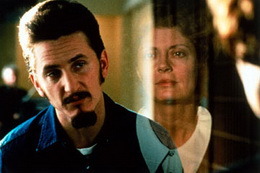
1. Dead Man Walking (1995) / Tim Robbins
Based on the book by Sister Helen Prejean, this powerful movie explores both sides of the death penalty issue without stepping out of bounds one way or the other. This may seem like a novel idea in the wake of recent movies like “Crash” that employ such sledgehammer tactics, but Tim Robbins pulls it off with a surprisingly sure hand. It was his second movie, and although its hot-button topic meant it had the potential to be more directly political than “Bob Roberts” or “Cradle Will Rock,” it comes off instead as an excellent character study that refuses to let audiences off the hook easily. This is the kind of film that doesn’t tell you what to think, and it is guaranteed to start lively discussion and stir plenty of emotion. Robbins also proved to be a very talented director of actors, including Susan Sarandon (who won an Oscar for portraying Prejean) and Sean Penn (in his best performance ever, and yes, I am including his Oscar-winning turn in “Mystic River”). Look for a small role by a pre-fame Jack Black, an old friend of Robbins who has appeared in all three of the actor’s films.
Sister Helen Prejean: You are a son of God.
Matthew Poncelet: [in tears] Thank you. I’ve never been called a son of God before. [laughs slightly] I’ve been called a son of a you-know-what plenty of times, but I’ve never been called a son of God.








{ 4 comments }
Man, I am not sure if you can call Tom Green an “actor” but damn that movie is near perfect. And wow, you actually remembered Big Night.
If I openly admit how many times I have watched Garden State AND listened to the soundtrack I’ll be banned from the site for being such a tool. Good picks except for the couple I haven’t seen. [/guilty foot shuffle] I also am a fan of That Thing You Do! but what can I say… I’m a chick.
I agree the FGF was an interesting flick but I still have to repress a constant urge to hunt down Tom Green and beat him over the head with a ball peen hammer.
I LOVE “That Thing You Do,” but since JD made it his number one, I left it off of my list for variety’s sake. Interesting is a nice way of saying, “WTF? Eric is nuts.” I appreciate it.
You’re right. I think you’re nuts for ranking FGF in your top ten… But understand that I repeatedly watch the movie Meatballs, so perhaps I am not the best critic.
Comments on this entry are closed.